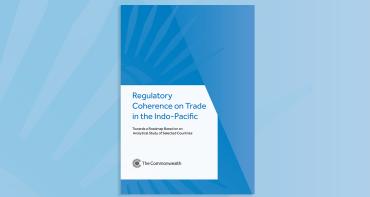The Global Forum now has 137 members on equal footing and is the premier international body for ensuring the implementation of the internationally agreed standards of transparency and exchange of information in the tax area.

Blog by: Lucas Rutherford, economic adviser at the Commonwealth Secretariat
What was clear as I stepped into the annual meeting of the Global Forum on Transparency and Exchange of Information in Tax Matters is that discussions at this event were going to make ripples around the globe. Held in the chilly but very welcoming city of Tbilisi, Georgia, this is big - and not only in terms of its title.
The world's largest multilateral #tax forum has begun in #Tblisi #Georgia. #Commonwealth represented by Lucas Rutherford & Robbie Hopper. pic.twitter.com/IWRQcSqnvY
— The Commonwealth (@commonwealthsec) November 2, 2016
With 134 members, it is the world’s largest forum on taxation and includes 34 Commonwealth members. Additionally, a large number of dependencies and territories of Commonwealth countries attended in their own right.
The forum has the very important function of monitoring the implementation of tax transparency standards. These are standards for the exchange of information between authorities in order to prevent tax evasion. The initiative evolved out of a desire to create ‘a level playing field’, making sure that those who provide cross border financial services do not benefit from a lack of compliance.
The Commonwealth is a staunch proponent of this level playing field, and in particular ensuring that it is not only small countries that are expected to comply. This is why it is a longstanding observer of the forum, along with a number of other international organisations.
With Pakistan, Papua New Guinea, Ghana and other developing countries joining the Forum, there is an increasing recognition of the value that tax transparency can provide to a broader range of countries. Certainly, looking around the large table in the large ballroom you can see the concept of the level playing field in action. St Kitts and Nevis is seated next to Russia. The Cook Islands sits next to China.
All are there are on an equal footing with the smallest and largest jurisdictions alike intervening throughout the discussions. For many of the Commonwealth’s smallest members that host international financial centres (IFCs) this forum is crucial. This is evidenced by the fact that Barbados is represented at a ministerial level, and St Kitts and Nevis by their Prime Minister.
Today ComSec sits on panel @ int'l #tax forum in #Tbilisi alongside @OECDtax @ATAFtax @WorldBank @EBRD & @OECD's Global Forum Secretariat pic.twitter.com/Kj7aTIyxG7
— The Commonwealth (@commonwealthsec) November 2, 2016
It was a great pleasure to speak on a panel alongside the World Bank, the African Tax Administrator’s Forum and the European Bank for Reconstruction on Development. It gave us the opportunity to provide the Commonwealth Secretariat’s reflections on what has been a big year in the tax transparency and broader tax and regulatory agendas. This was in large part a result of the significant international attention on these issues that followed the release of the so-called ‘Panama Papers’.
I was able to provide an overview of the discussions at this year’s Commonwealth Finance Minister’s Meeting in Washington, which sought to promote a dialogue between the Commonwealth’s small state IFCs, G20 and developing country members on the various issues raised by the Panama Papers. Our main point was that, in an international context which now includes the development of both G20 and EU blacklists, understanding the perspective of different jurisdictions is critical.
I also had the opportunity to emphasise some of the key messages coming from many of the Commonwealth’s small states that host IFCs. We have been engaging with these jurisdictions throughout the year, and it is clear that there is a need to recognise the resource constraints facing them in dealing with a rapidly evolving international agenda. What is also evident is their strong support for the role of the Forum, its inclusive processes and the platform it provides for small states to raise their concerns.
As delegates from the world’s largest and most inclusive tax forum started to make their journeys home to all corners of the globe, it was clear from both formal and informal discussions at this year’s meeting that the biggest emerging international tax issue relates to the blacklist being developed by the EU. Whilst still evolving, it looks set to go beyond tax transparency standards to look at other features of a country’s tax system, including tax rates. This has left many jurisdictions reflecting on the concept of fiscal sovereignty, that is the right of each jurisdiction to set the parameters of their own tax system.
What is clear is that these tax issues will continue to remain at the forefront of the international economic agenda. The Commonwealth will be carefully watching developments and will continue discussions about how we can continue to support our members voice.



